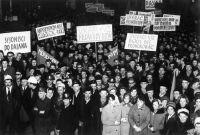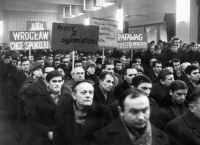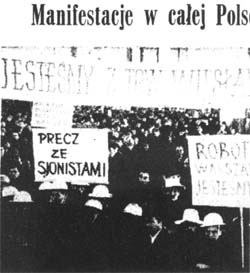





Meeting of the employees of PAFAWAG works in Wrocław, 14th March 1968. The regime considered students' protests against the ban on the stage performance of "Dziady" by Adam Mickiewicz as anti-state action and suppressed them brutally. Those actions needed public support, so throughout the country there were organized mass meetings and rallies in support of the policy of the communist party and its leadership.
On 21st March 1968 at Red Army Square in Opole there took place a mass meeting, that gathered a crowd of 20 thousand. Such mass meetings were organized on regime's initiative. Activists were distributing banners among the workers, who were being brought there directly from their factories and ordered to chant particular slogans, in many cases unintelligible for them.
Anti-Israeli press campaigne. For the communist regime, the Israel's successful war with the Arab countries in June 1967 (so called Six-Day War) became the pretext for political purges. Blame for the crisis was put on the people of Jewish origin, who were accused of "lackeying the imperialist state of Israel".
Rally of the workers of the Świerczewski Works in Warsaw, 14th March 1968.
Over 50 thousand members of the communist party from Lower Silesia rallying at Dąbrowszczacy Square in the centre of Wrocław, 18th March 1968.
|

Meeting at the "Ursus" Works in Warsaw, 16th March 1968. During such meetings there were being condemned "ringleaders and inspirers" of the student excesses.
Rally in the hangars of LOT (Polish Airlines) at the Okęcie airport in Warsaw, under the banner: "Warsaw wants peace...".
Władysław Gomułka at the meeting with the Warsaw's communist party activists ,19th March 1968. In his speech he blamed mainly the youth of the Jewish origin for provoking student unrest, calling it "Zionist conspiracy".
The Polish press emphasized the strength of the rallies, sometimes retouching the inscriptions on the banneres to make them even more noticeable to the readers.
The antisemitic campaigne (carried out under the guise of "anti-Zionism") was unleashed by the mass media and particularly by the press. The western countries were being accused of supporting Zionism and organizing anti-Polish campaigns.
|

W prasie specjalnie eksponowano liczebnoć manifestacji, czasem nawet retuszowano napisy na transparentach, aby nie umknęły uwadze czytelnika.
In march 1968, following the wave of students' protests, the communist regime referred to the proven method of disposing of its political adversaries - they found a scapegoat. This time it were the Jews. The 1967 Isaraeli-Arab War gave them the needed arguments "justifying" getting rid of their "cosmopolitan" (meaning: of origin other than Polish) comrades. The Polish regime, following the Soviet Union, declared for the Arab states, accusing Polish Jews of favouring Israel. Having declared the latter an aggressor, Polish regime broke off all the official relations with it. The media unleashed the "anti-Zionist" campaign against all the Polish citizens of Jewish origin. Thousands of them lost their jobs, were persecuted and eventually forced to abandon all their property and to emigrate. Only few Poles were courageous enough to oppose the communist regime and protest in public. Between 1968 and 1972 about 30 thousand Polish citizens of Jewish origin left the country, most of them assimilated and associating their perceived future with Poland.
In the aftermath of the campaign people regarded as Jews were expelled from the communist party and then fired from their jobs. In many cases they have to leave Poland. Similar hardships became the lot of those non-Jews, who dared to protest openly against the regime's actions. |

